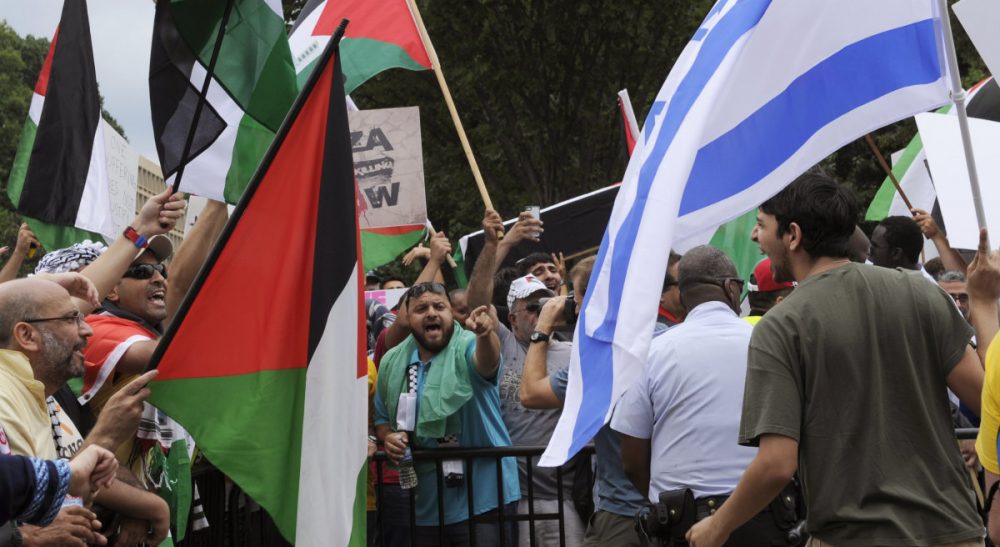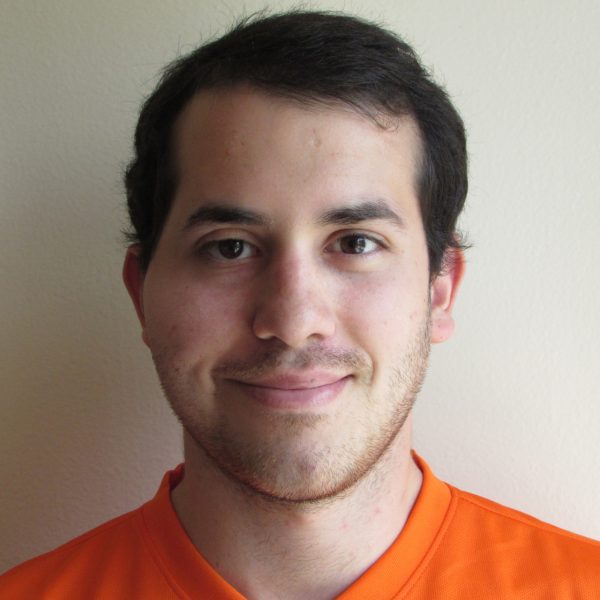Advertisement
Conflict And Common Ground: The Story Of An Unlikely Friendship

The day I turned 18, I received a letter from the Israeli government informing me that it was time to pack my bags and join the ranks of the Israeli Defense Force. I had just been accepted into Connecticut College and had no intention of abandoning my education to learn how to operate a TAR-21, so I went with my father — who served in the IDF for six years — to the Israeli consulate and filled out the paperwork to defer my service.
...outside of our homes the average American didn't really care about the Israeli-Palestinian conflict -- which was and is problematic -- but it allowed two kids who liked sports to become friends without anyone telling us that we shouldn't.
Three summers later on July 11, I found myself back at the Israeli consulate for a very different reason: to attend a pro-Palestinian protest.
I stood next to Hani, a Palestinian-American and one of my closest friends, watching the protesters draped in red and green chant anti-Israel rhymes up to the 10th floor of the Park Plaza office building.
Hey, Israel, what do you say? How many kids will you kill today?
I had come as Hani's guest. We met as kids on a suburban soccer field and bonded over our Middle Eastern ties and mutual love of hummus. Despite our personal convictions about our warring second-homes and our memberships to family trees firmly rooted in opposing soil, over the years our unlikely bond, which in another setting would have torn us apart, served to bring us closer together in an American context.
This American context allowed us to interact in the enriching middle ground that continues to physically and emotionally elude those who live in the Middle East. While Hani grew up hearing stories of his family’s exile from Israel in 1948, and I grew up learning about Arab attempts to destroy Israel, our families did not raise us to hate the other. And outside of our homes the average American didn't really care about the Israeli-Palestinian conflict — which was and is problematic — but it allowed two kids who liked sports to become friends without anyone telling us that we shouldn't.
If Hani and I had grown up in Palestine and Israel respectively, the boundaries between us would have been numerous, institutional and tangible. The only way I could have passed through the walls and checkpoints dividing us would have been as an active member of the IDF — a situation not conducive to friendship.
In America, none of those boundaries exist, however, and the only thing that could keep us from being friends is each other. But we like each other, so why not be friends?
In America, none of those boundaries exist, however, and the only thing that could keep us from being friends is each other. But we like each other, so why not be friends?
Our unique friendship is not devoid of conflict, however, and there have been many times when we have clashed. Whenever the conflict spikes overseas, our conversations seem to mirror the increased tensions, and there are moments when I get incredibly frustrated when he expresses an opinion I just can’t accept or grasp. No matter how heated our debates get, however, we don’t let stubborn pride or anger blind us from our core friendship.
The rocky times in our friendship are especially important because they force us to engage in dialogue, an essential opportunity that remains unavailable for most.
To that point, the other day I received a reply from a Palestinian-Iraqi woman in which she told me the message I had previously sent her regarding the conflict was possibly the first time an Israeli had ever engaged her in dialogue instead of insults.
Reading that reminded me how important and rare my friendship with Hani truly is.
I consider myself incredibly fortunate to have grown up with Hani, but when I looked at the protesters in front of me, I knew it was the kind of relationship they had almost certainly not been afforded.
Hani joined them while I hung back, listened, observed and took pictures. I had a friend in the crowd, but I was an outsider at this event.
While I was trying to find my place at the protest as someone merely attempting to gain new perspectives, a small crowd showed up across the street wearing blue and waving Israeli flags.
Hey, Hamas, what do you say? How many rockets will you shoot today?
Unable to escape feeling that I was on the wrong side, I wandered across the street. Still, I felt like an outsider looking in. Their chants began to compete with the chants of the Palestinian side, making it impossible to hear either side. Nobody was engaging anybody, they were just yelling.
I didn't feel comfortable firmly entrenched on either side and wished there were some middle ground between the two in which to stand. Oncoming cars forced me to pick a side, however, so I stayed on the side I knew.
Everyone else around me looked across the street and saw only labels, but my link to Hani prevented me from looking across the street and seeing a faceless “other.” It allowed me to look and see people.
When their protesting permit expired, the Palestinian supporters crossed the street to engage the Israeli supporters. I suddenly found myself surrounded by a mob of people repeatedly chanting, “Shame on Israel!”
I lost Hani in the crowd.
While I came to the protest to gain some new perspectives, all I found was a mix of old anger and an absence of a middle ground. A perfect microcosm for the conflict itself.
What I did gain from my experience, however, was a reaffirmation of the importance of friendship. Hani and I did not talk during the protest, and we stood on different sides, but throughout the entire event I knew that I had a connection with someone on the other side. Everyone else around me looked across the street and saw only labels, but my link to Hani prevented me from looking across the street and seeing a faceless “other.” It allowed me to look and see people.
When the protesters dissipated, Hani and I found each other and we left as we came — together.
Related:
